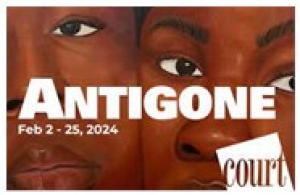
***RECOMMENDED*** Court Theatre's Oedipus Trilogy comes to a fitting and deeply satisfying conclusion with its very daring and bold new production of "Antigone," written by Sophocles. Associate Artistic Director Gabrielle Randle-Bent has directed a timeless classic with such strikingly vivid strokes that the work is virtually reimagined by her visionary choices. Wisely, Randle-Bent has utilized Founding Artistic Director Nicholas Rudall's translation. Rudall, whose career spanned over four decades as a Professor Emeritus in Classics at the University of Chicago, is widely recognized as an expert in making ancient Greek tragedies engaging for modern audiences. Since "Antigone" is a play whose central theme is justice, it seems like true poetic justice that Court Theatre's final offering of the trilogy should exalt in Rudall's translated text. 3 SPOTLIGHTS
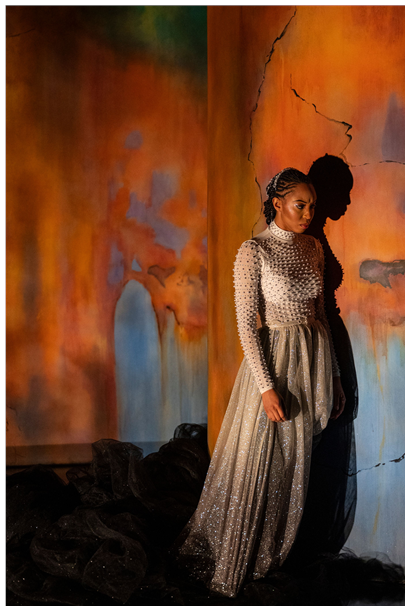
Aerial Williams as Antigone
From the very beginning of the performance, before even a single actor has taken the stage, this "Antigone" feels different from any that may have come before it. In voice-over, we hear a taped conversation of several women discussing another woman who refused to move to the back of the bus, a la Rosa Parks, and conjuring images of numerous other Civil Rights activists. That's not to say that this production of "Antigone" is set in the American South during the latter half of the 1950s. Nowhere near. Randle-Bent's version comes across as noticeably ageless and ethereal, with no specifically set place or time.
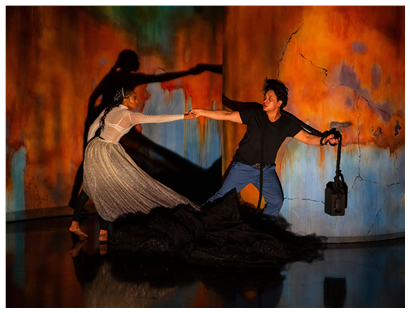
Following the events of "Oedipus Rex" and "The Gospel at Colonus," the action of "Antigone" involves the title character, played by the captivating Aerial Williams, as she returns to her village (the ancient Greek city of Thebes in the original Sophocles) from which she, along with her father Oedipus, had been banned by Creon, the king (Timothy Edward Kane). She is accompanied by her younger sister Ismene (Ariana Burks) and mourning the death of both of her brothers, Eteocles and Polyneices, who clashed on the battlefield during a bloody civil war and killed one another. Eteocles was praised as a hero while Polyneices was branded as a traitor. For this reason, Creon forbids anyone from moving the dead body of Polyneices, as he wants to make an example of the deceased defector, and let the body rot under the intense heat of the noonday sun.
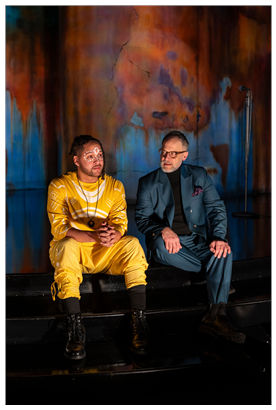
Of course, Antigone defies Creon's edict and is soon detained, guarded by the Watchman Who Becomes Messenger (Julian Parker), and imprisoned within a cave or tomblike vault. The only visitor allowed to see her is Haimon (Matthew C. Yee), son of Creon and Antigone's betrothed. This being a Greek tragedy, we need to have a Greek chorus. Demophilus (Danielle Davis) and Euboule (Cage Sebastian Pierre), listed as poets, deliver some of their lines in sung verse, some as if they were hip-hop recording artists and some in an almost improvisational vocal percussive style reminiscent of beats that you may hear at a poetry slam. They both give highly energized performances and are quite often in constant movement, recreating native tribal dances.
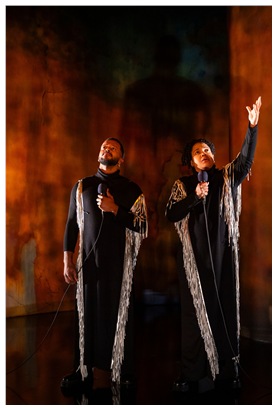
Rounding out the ensemble is the always fascinating Cheryl Lynn Bruce as Tiresias, a blind prophet. Bruce makes a late appearance and graces the stage for a mere five minutes, but leaves a lasting impression.
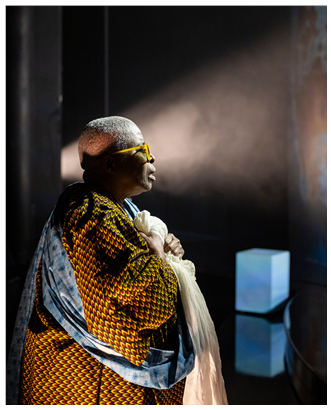
The entire design team is worthy of praise. John Culbert's textured scenic design is simple yet spatial, beautifully illuminated by Keith Parham's trippy lighting design. Raquel Adorno's costumes are varied and vibrant, especially those worn by Williams. The sound design and compositions of Willow James are oftentimes mournful but also occasionally joyous.
There are certain moments in this "Antigone" that directly disregard conventional rules of the theatre. It is a huge artistic risk to plunge the entire house into total darkness during a pivotal moment while your heroine delivers her most heartrending monologue in complete blackout. Also, having one of the two young lovers, in this case Yee as Haimon, wearing a live microphone tied around his waist while writhing around on the floor with Williams' Antigone is something right out of a 1980s performance art piece, with distorted feedback included. But, somehow, Randle-Bent and her entire cast make it work.
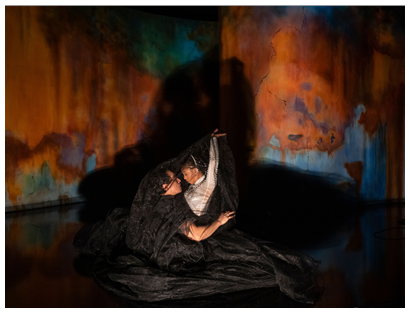
It is magnificently apropos that this "Antigone" should end with a short and simple song. After all, following last season's installment of "The Gospel at Colonus" -- which was a musical, not surprisingly -- it just seems a perfect ending to this theatrical odyssey. As Ismene, the sole surviving sibling, assesses all of the loss she has endured in her young life, she sings a song of hope and lifts the final note up over the audience and out into the cosmos.
_____________________________________________________________________
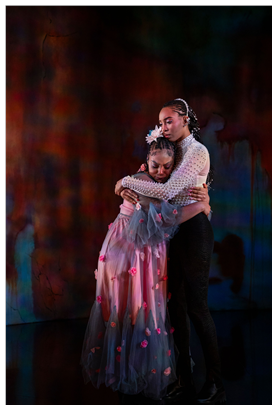 "Antigone" continues through March 2, 2024
"Antigone" continues through March 2, 2024
Court Theatre is located at 5535 South Ellis Avenue, Chicago, IL
Tickets: Please call 773-753-4472 or visit www.CourtTheatre.org
Run time is approximately 90 minutes with no intermission
